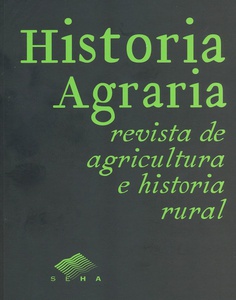RHN 83/2013 | Publication
Contents:
Land owned by craftsmen. Agrarian ownership among Valencian artisan families (1370-1450)
Iván Martínez Araque
Abstract: During the Late Middle Ages, in many European regions, artisans owned large amounts of land, though these were not central to their work activity. In the Valencian case, there are constant references to this in notarial and judicial sources. Nevertheless, there have been few in-depth studies of this subject. This article deals with the role of plots of land in the domestic economies of small enterprises and their importance in the social strategies of the families involved. We offer several examples from around the Valencian region at the end of the 14th and beginning of the 15th century. This includes professionals in small rural towns, as well as artisans from Valencia or other urban centres.
Unwritten customs in Guipuzcoan communities during the Early Modern Era
Estíbaliz González Dios
Abstract: In this paper we explore the meaning and scope of unwritten customs in villages, hamlets and communities of Guipúzcoa that were under the jurisdiction of towns. The sources used in this research have primarily been judicial proceedings and notarial documents. A comparison of these sources has allowed us to observe various aspects of the management of villages and hamlets and, in particular, the meanings and connotations attributed to customs, which should be taken with some reservations. Moreover, we have focused on customs as localisms or privileges acquired by the community, along with their singularity and their attribution as dating back to time immemorial.
Caciques or politicians? Politicisation and local power in rural Mallorca (1850-1923)
Pere Salas Vives
Abstract: The aim of this paper is to analyse the process of politicisation experienced by rural society in Mallorca during the consolidation of the liberal state in Spain, between 1850 and 1923. We begin with the hypothesis that the state, through its various administrative levels, was able to put an end to the dynamics of absolutism and foster a new politicisation of society, initiating a process of democratisation. This article examines a number of municipalities that are representative of the various socioeconomic realities of Mallorca. Logically, the documentary bases of this article derive from local sources, especially municipal records. The results of our comparative study confirm the initial hypothesis. Liberal legislation, the extension of suffrage, changes among the political elites and the new role of local government as delegate of the central government and representative of the community became relevant elements in the new political- institutional context. Moreover, the penetration of ideologies such as republicanism and socialism, as well as the transformation of the relations of production and the capitalist integration of rural areas, altered the expectations of the population and its relationship to politics and public administration. As local inhabitants became citizens, rather than becoming demobilised, they increasingly turned to local politicians and institutions to improve their living standards, eliminate injustices or resolve problems of all kinds.
Confusing categories: peasants, politics and national identities in the multilingual state, Belgium c. 1880-1940
Leen Van Molle
Abstract: The politicisation of the farming population has been at the centre of a long academic debate in European historiography. If anything has become apparent so far, it is that the process was neither linear nor unambiguous. Belgium a bilingual country since its establishment in 1830 is a fascinating case in this respect. This paper points out the singularity and complexity of the Belgian example, focusing on the role played until World War II by farmers’ associations in affirming or reordering national identities and strengthening or weakening ideologies and political parties. Initially, there was a convergence around a coherent Belgian Catholic organisational model that rested on a romantic nationalist image of the peasantry and countryside. But organisational fragmentation eventually prevailed, causing splits along two fundamental fault lines in Belgian society: the ideological and ethno-cultural cleavages. This article argues that farmers’ associations faced the challenge of navigating through the Belgian political imbroglio, using party politics as an instrument for their own economic and social ends. In so doing they became involved or even ensnared in the minefield of politics, subsequently contributing to the reaffirmation of Belgium’s political fault lines. The analysis is based on relevant primary sources along with the combined use of three scholarly sub-disciplines that do not often appear together: rural history, political history and the history of nationalism.
Building the place. The plaza in the villages of the Instituto Nacional de Colonización
José Antonio Flores Soto
Abstract: This article analyses the mechanisms that were used by the Instituto Nacional de Colonización (INC) for designing new villages. In particular, we study the importance of the plaza or town square, understood as a meaningful urban element. This involves an examination of the implications of the plaza in urban design, as well as its role in the construction of images for those who came to inhabit villages in areas that had been turned into land for irrigation during the second half of the 20th century. The villages in this study include some of the best known examples of Francoist colonisation. Our representative sample covers 63 of 300 villages built by the INC in Extremadura between 1947 and 1971, and spans most of the INC’s period of operation. We study the relationship between international changes and local transformation of the concept of representative urban space: the transition from traditional village models to modernising ones.
View the full table of contents and abstracts here: www.historiaagraria.com
Source: www.historiaagraria.com
